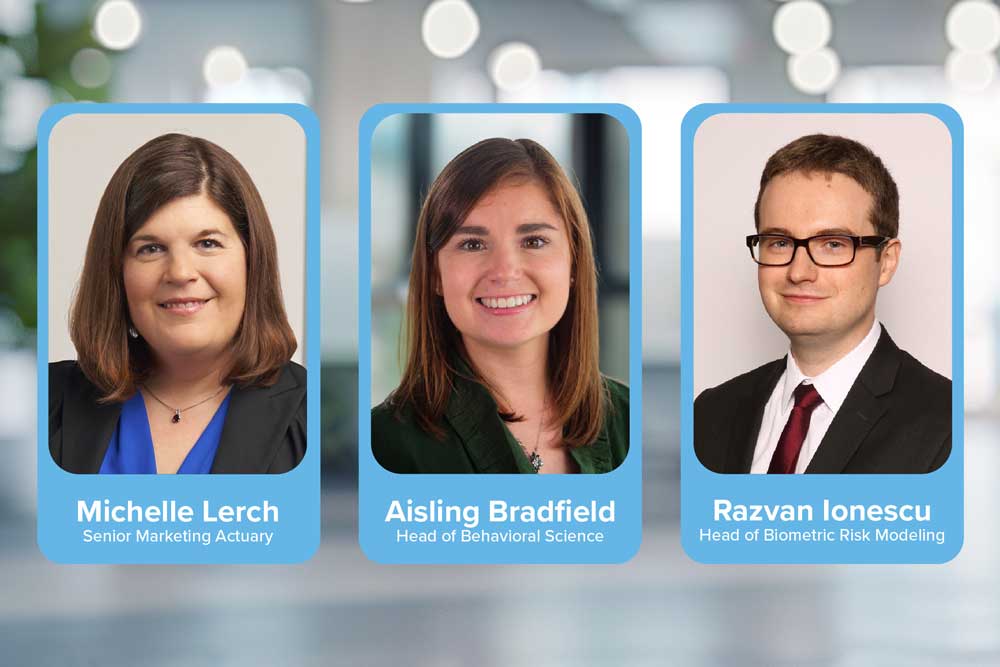
SCOR Actuaries
Art and Science, a balancing act for actuaries
Understanding the actuarial profession in (re)insurance
Career Compass
Actuaries play a crucial role in (re)insurance, with a high demand for their expertise. Yet this role is often little understood and only a relatively small number of individuals get certified in this field.
They are a critical part of our business – but what is an actuary? What do they do, and how do you become one? Actuaries have existed for centuries, with evidence of this specific job title since 1762. In this article you will find out more about actuaries at SCOR, what they actually do, and how they help build a more resilient world through the Art and Science of Risk.
Before we look at what being a (re)insurance actuary involves, we need to understand why they are so crucial to the industry. In a regular business model, where companies sell products and services, the cost and profit margins are already known. In insurance, this business model is inverted. When you sell insurance coverage, you are selling a product without knowing the ultimate cost involved. For example, when you sell car insurance, you don’t know if that driver will be involved in a collision, or, if they do, how severe it will be. In insurance, the cost and profit margins are calculated and predicted upfront, taking into account as many different scenarios as possible to ensure that all eventualities are covered. This is where the Art and Science of Risk comes into play.
Based on large datasets, actuaries make extensive and complex calculations to analyze and understand risks. They feed data into models to estimate and forecast the probability of an event occurring in the future. This enables them to predict the amount of claims a company is likely to receive for a given insurance product over a certain period of time.
To continue with the previous example, when someone applies for car insurance, actuaries help to determine the price of the premium they should pay by calculating the number and severity of accidents that the vehicle could be involved in. Based on these forecasts, they develop a price that should cover the potential costs involved.
More than just “number crunchers,” actuaries are also experts on societal trends and policyholder behavior, which are key factors when it comes to understanding risk and how it evolves over time.
Beyond predicting the type and amount of events a (re)insurer can cover, actuaries use their analytical skills to understand what lies behind a risk, what drives it, and what causes it to change or evolve. So, they assess the likelihood of future events, but they also identify opportunities for preventing risks and solutions to help mitigate the impacts when they do occur. Our SCOR actuaries strive each day to have a better understanding of risk, so that we can continue to protect people and societies.
As Aisling Bradfield, SCOR’s Head of Behavioral Science, says, “It's really analytical and logical, but there's also a big storytelling element because you need to know the story behind the data and be able to then translate that into the business impact and the real implications.”

Still have questions? Our experts have answers! Below, SCOR actuaries Michelle Lerch, Senior Marketing Actuary; Aisling Bradfield, Head of Behavioral Science; and Razvan Ionescu, Head of Biometric Risk Modeling, answer some of the most frequently asked questions about their profession.
What are the differences between underwriters, data analysts, and actuaries?
ML: “Think of it like the forest and the trees. The underwriters focus on pricing the individual trees, while the actuaries are looking at the forest. So, what we are trying to do is make sure that, on average, we get it right.”
AB: “For actuaries, it always comes back to asking, ‘and why is that?’ Data scientists can go to great lengths to rank variables using predictive modeling and statistical methods, but then an actuary will question whether that is actually going to continue into the future. And the best way to figure that out is to dissect why it's happening now.”
How does actuarial work differ between insurance and reinsurance?
RI: “Reinsurance actuaries deal with fewer problems linked to portfolio management, compensation, and the need to sell products. Meaning that in insurance, there is a lower focus on the technical side. In reinsurance, we don’t encounter those problems as much because we are dealing with blocks of business rather than individuals. Meaning that the focus in reinsurance is less on management and more on research, forecasting, and understanding complex topics.”
How do I become an actuary?
ML: “There is a credentialing process consisting of a series of exams that we all go through to achieve different levels of certifications. There are various associations, depending on the country where you are based. In the US, we have the Associate of the Society of Actuaries (ASA) accreditation for life and health, as well as the Fellowship of the Society of Actuaries (FSA). To gain these accreditations, you have to go through a series of about 10 to 12 exams. Actuaries in other countries become accredited through the Society of Actuaries (SOA).”
How is my career as an actuary likely to evolve?
RI: “While most actuaries start out in pricing, the opportunities for growth are numerous and diverse. Here at SCOR we have a free career path, which can go in three different directions: leading people, leading topics, or leading projects. When you are fresh out of school, you first have to get to know and understand the industry. As you learn and grow, you can become specialized and focus on a specific field of interest, or you can grow into a management role where you are leading people. It is possible to move to other sectors, but the more time you spend in one area of expertise, the harder it is to broaden and change your expertise or focus.”
What impact will AI have on actuarial work?
ML: “The tools that we have at our fingertips are going to change and make things easier, but at the end of the day, it still doesn't take away the need to make sure that what, how, and why we're doing it makes business sense.”
Want to be part of the Art and Science of Risk?
Check out our actuarial job offers around the world – and learn more about our internationally renowned SCOR Actuarial Awards!
Related articles






